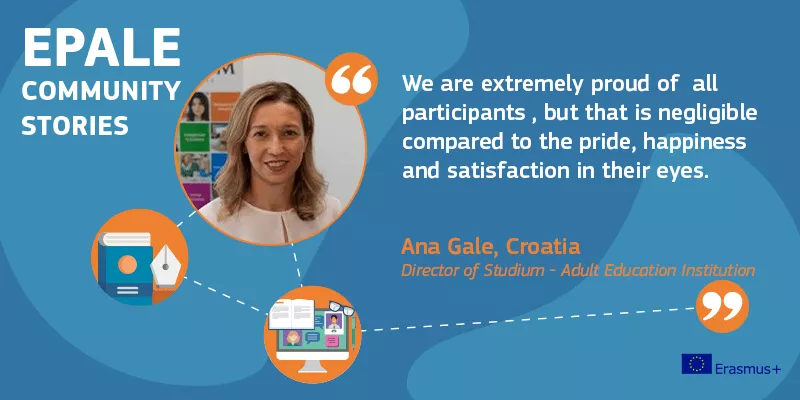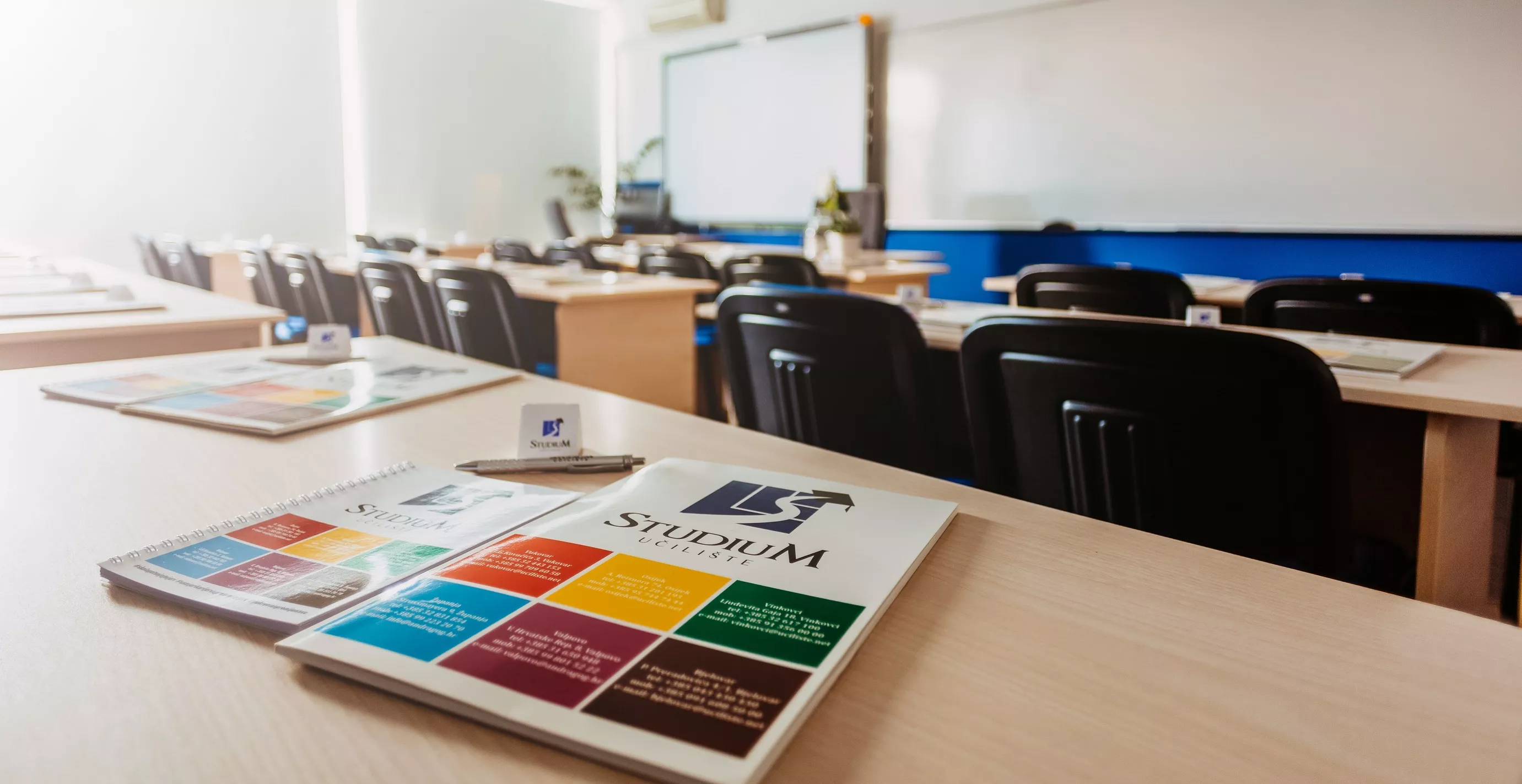Ana Gale, a Community Story from Croatia

I am the director of on adult education institution in Croatia. The story of the Studium - Adult Education Institution began in 2010. In the heart of Slavonia, the city of Vukovar, adult education has come to life. Today it is expanding and developing in many cities across our region. It began with small groups of students who expanded and developed from generation to generation and met market needs. Through the friendly atmosphere of employees, professors and the cooperation of the highest quality health professionals, generations of physiotherapeutic technicians, pharmaceutical technicians and numerous other qualifications in the field of health care have been created, for the first time in adult education.
In a very short space of time, there was a greater desire and need from participants for our services in other Slavonian cities and our story began to spread in all directions across Slavonia and Baranja. We expanded into Osijek, Vinkovci and continued towards Valpovo and Županja and Bjelovar. In a very short space of time, Studium became the leading school in Slavonia and Baranja. It developed numerous programs from various business sectors - from economics, trade and administration, electrical engineering and computing, construction and geodesy, agriculture, food and veterinary, mechanical engineering, shipbuilding and metallurgy, textiles and leather, through tourism and catering, personal services all the way to health and social care, of which we are most proud of our specialist training programs in hospitality and catering that have proven to be a hit and the most sought after training in our market, based on tourism and services.
Through the implementation of numerous programs, we have established cooperation with various ministries, institutes, counties, cities, municipalities and leading companies from various sectors that have brought great satisfaction to our students through their practical classes. With new knowledge, new qualifications and a smile on their face, the students left our Institution and often later informed us about their successes in their new careers.
We can proudly say that with the retraining programs for leading occupations in today's market, we have trained many students who have successfully applied their knowledge in practice! In our work, we are constantly developing new programs, tailored to the needs of the local market, and we nurture cooperation in many areas. Our work was also recognised by the Croatian Chamber of Commerce and in 2018 we won the prestigious Croatian Quality Label for Adult Education. We can proudly point out that we are the first adult education institution to bear the Croatian Quality mark. We carry this label with a great sense of responsibility and we strive to justify and improve it through the implementation of educational programs.
It should also be noted that, in addition to the above, we have gained recognition by writing and implementing EU projects that we seek to contribute to increasing employability. With the implementation of EU projects, the opportunity for free education is most often given to marginalised groups of people, such as the permanently unemployed, people with primary education and people with lower qualifications. We have 5 successfully completed projects behind us, and 10 of them are currently in progress. We participate in projects as partners, users, but also as holders, which we are extremely proud of. In our work, we start from the belief that adult education is a driver of social change, and with this motivation we strive to provide the most we can for the society in which we operate.
Thinking about the EPALE platform and the period in which we have used it, we really cannot define an exact date when we first found out about the platform. We have known and used it since we have been working in adult education, and since the Agency for Vocational Education and Training and Adult Education was born, through the merging the Agency for Vocational Education and Training and the Agency for Adult Education. The Agency for Vocational Education and Training and Adult Education introduced us to the EPALE platform and taught us how to use it and how it can contribute to the development of our institution and positioning in the world of adult education.
Given that much of our business is based on EU projects, this platform has helped us find partners for Erasmus+ projects.
Also, numerous sample copies of educational programs were published on the EPALE, which enabled us to more easily create new programs and harmonise existing ones.
Through this platform, we could get information at any time about the latest news from the world of adult education, and from numerous events, projects and activities in which we participated.
For these reasons, along with the Agency for Vocational Education and Training and Adult Education website, as well as that of the Ministry of Science and Education, EPALE is one of the most visited websites of all employees of our institution.
In our regular business, online teaching was minimally used. First of all, there was the fear of the unknown, the fear that our staff, lecturers and, ultimately, students would not be able to cope successfully in a virtual environment and that this would affect their end result. We did not dare to risk the quality of education by moving to a virtual environment. The tools we used in implementing educational programs in our regular distance learning business were based on email, telephone communication, and social media. Precisely for this reason, the sudden transition from physical classrooms to virtual ones was a big shock, both for us and for our lecturers and students. We expected difficulties in the hitherto well-established system, the dissatisfaction of students and lecturers, fear was ubiquitous, but the situation required us to adapt. And we adjusted!
In our transition to online teaching, we were greatly supported by the Agency for Vocational Education and Training and Adult Education with its recommendations on how to implement educational programs to which we have adapted. Before we started with online classes, we asked our regular lecturers to try out programs that can be used to record lectures, in order to get feedback on the required level of IT knowledge and programs that will allow us to do so in the easiest way possible. We also asked them to try out virtual classrooms and programs that enable real-time teaching. The feedback cheered us up, all the tools were easy to use for both lecturers and attendees. Based on the gathered information, we created instructions and recommendations for the lecturers, provided numerous examples and provided technical support for all questions. We installed the necessary programs on the computers in the institution and invited the lecturers, if they do not have all the technical requirements in their homes, to use ours for lectures. The professors reluctantly accepted our recommendations and proposed new, additional solutions, and we accepted many of them.
The majority of classes, already in the first week, for all groups, were organized in such a way that we created virtual classrooms for each subject and invited students to join them. We created instructions for the participants on how to listen to their classes in the virtual world. We asked them to contact us if they have any difficulties and if they do not have devices with which they could monitor the lessons. For participants who do not have the necessary technical solutions, we have enabled them to use ours during a pandemic.
The lecturers recorded their own lectures with a screen recorder and loaded them into virtual classrooms, with accompanying instructions. For programs that required real-time play, such as foreign languages, the lecturers gathered their groups with the help of tools like Zoom and Skype. For all participants, we organized a work task for each lecture, as a confirmation that they listened to and adopted the learning outcomes related to the lecture.
We tried to make the tasks interesting for the participants and we introduced different games, tasks with the help of making videos, creating different documents, tasks related to content, current situation, etc. The lecturers used different tools available to them and in this way they made the virtual classroom interesting and dynamic. We must point out that the participants managed very quickly in a virtual environment and there were no major difficulties or elements in the implementation that would make it impossible to attend the enrolled program.
In this way, we brought into one online classroom students aged 15 to 50 and over, with different levels of education and different IT background. Once again, adult education has challenged us to harmonize their knowledge and provide equal conditions for all, this time in a virtual environment. Therefore, we asked for feedback from the participants themselves. We were interested in how they experience the new conditions, to what extent they are satisfied with the implementation, what they would change, add, etc..

The feedback we received was extremely satisfactory. The participants were satisfied because, given their regular obligations, this time they can attend classes at any time, and not in the manner prescribed by the schedule. In particular, they pointed out the dynamism of teaching achieved by using tools that make the process easier. Most importantly, they did not feel deprived of this form and praised the organization and support throughout the process. Obtained information made us especially happy and encouraged us to adapt some of our regular programs to the virtual environment in the future.
We are extremely proud that our staff, lecturers and students managed to organize and cope in virtual classrooms, especially because the organization itself took place from the home offices, which has not been the practice in our institution so far.
At that time, we were not sure whether all participants would have the conditions to perform this activity, so we decided to call each one separately and refer them to the process. We arranged an appointment with all of them, we agreed on how the questions will be delivered to them (Viber, MMS, by phone…) and even who will record them in the given activities. We gave them enough time to get organized and all participants submitted their work within the deadline.
We were extremely proud of them, but that is negligible compared to the pride, happiness and satisfaction in their eyes. They all successfully completed the required tasks and received their, more than deserved, certificates of competency!
We can conclude that this situation has changed us all and allowed us to look at life from a different perspective. Everything that seemed complicated and far-reaching to us came true overnight. All fears and prejudices have disappeared, and we have gained the confidence to adapt the educational process to the new world, the world of technology, Internet and many other opportunities that technology offers us. Now that we know that we have the staff, technical conditions and knowledge, in the future we will certainly implement educational programs in a virtual environment and thus enable the attendance of programs tailored to the private obligations of students.
We're looking forward to hearing your story. Share your story today!


